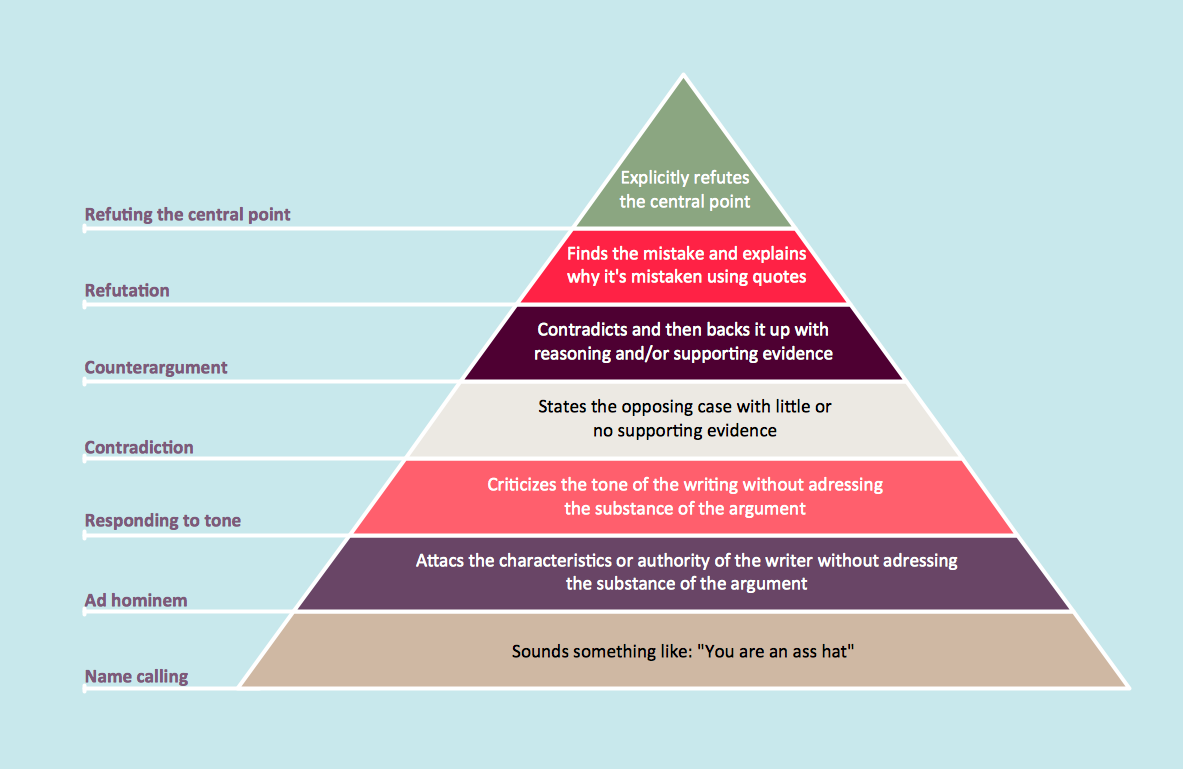Disputes on the Internet are inevitable and sometimes even fun. But it’s not so fun when debates occur at work. You have to deal with them.
Contents
Types of comments
The gold standard classification of comments is the pyramid of disagreement made by programmer and investor Paul Graham.

Name calling: “You’re an ass hat”
Comments that are not relevant to the case. The disputant does not even try to prove that you’re wrong – he just loses his temper. Such comments rarely occur in the working communication. But if they do, the problem should be solved by the leader:
Such way of communication is not accepted in our company. If you have any comments on the subject matter, I will be glad to hear them.
Ad hominem: “You are wrong because you’re…”
The opponent refutes the idea of discrediting the author. If it is a planned stroke, he’ll expect that you’ll start to defend. Instead of talking on the subject matter you’ll be trying to prove that you have the right to speak. But it’s better to disarm the opponent: ignore the manipulation and insist on speaking on the subject matter.
– I will not listen to the opinion of someone who has never sold the phone.
– And now tell exactly what I’m wrong at?
Responding to tone: “How dare you say that?”
A person was offended by the way you responded about things dear to him. It’s your fault, your tone was irrelevant. Deal with the emotions of the opponent and return to the discussion.
Sorry, I did not mean to hurt you and your department. Let’s go back to what we were discussing.
Contradiction: “No, it’s not”
Now there is a real reason for the dispute. The opponent offers an argument that contradicts yours. But he has no evidence, so he starts pressing.
– As a marketing specialist I can assure you that the last year marketing worked perfectly. Yes, we had some problems with contractors, but all our campaigns had a great response.
– It didn’t work at all. I asked at the conference who heard about our company – no one heard. At all.
The evidence of the parties is not evidence in fact. It is baseless statements disguised as arguments. Most likely, people are arguing about different things. In such a situation also helps the leader.
Guys, the quality of work of marketing department we’ll discuss another day. Now we should answer another question. Any ideas on this subject?
Counterargument: “The client said…”
That’s good: an opponent offers another position and tries to back up. It’s almost a constructive dialogue. Guide it in the right direction:
– The customers constantly complain about courier delivery in facebook!
– And how many comments are left during the last month?
– Ten.
– Last month we had 100 deliveries. So, only 10% of customers are dissatisfied. We can figure out who delivered and shipped the goods with complaints. Make it separate task and check the result on Friday.
Refutation: “It is not quite true, because…”
Excellent. Your opponent does not only contradict you but also offers relevant arguments. An important point here: ensure that the debaters are talking about the same things.
Refuting the central point: “Here are the facts that prove the opposite”
Appreciate the employees who not only argue their ideas but also make efforts to understand the ideas of others. Often these people are not only decent but also not indifferent to you and your business.
Protection and attack
Both are not suitable at work.
If someone offended the colleague, the latter may fall into a stupor and begin to defend himself or even start attacking back.
– The delivery service works somehow, but we won’t write it on our website.
– Oh, the delivery works somehow? As if the sales department…
– And what do you have against the sales department? We, by the way…
– How dare you…
If such a conflict occurs, it must be resolved immediately. Never discuss business issues, if you are angry and resentful. It is not a recommendation or advice – it is a rule.
Help
An outsider is able to correct the situation adequately and quickly. The head of the department, manager, HR – anyone who has credibility in the eyes of the disputants.
Guys, the subject of your dispute disappoints me. You prove to each other that the other is a fool, rather than develop your own departments. Kindergarten. If you have any thoughts on the subject matter – send them to me at the end of the day. If not – get down to work.
How to avoid disputes
- Put the tasks clearly and describe what do you expect from your colleagues. Use special task management tools to monitor workflow. Do not ask them to speculate on any subject. Make strict limits and do not be afraid to follow them.
- Introduce strict deadlines.
- Be kind and generous. Thank those who work and participate in the discussion.
- Reread Carnegie.
- Connect to discuss only those people whose opinion is important.





